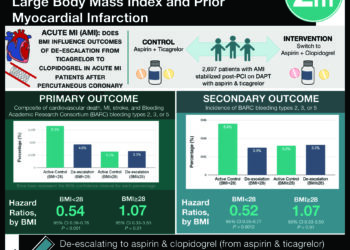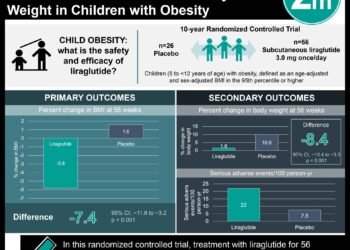Peer based health education program linked to reduced waist circumference
Image: PD
1. Children in a peer-based health education program had a greater reduction in waist circumference, but not BMI, than children in a standard health education program in this 10-month study.
2. Younger children in the peer-based health education program had significantly improved in knowledge of nutrition and physical activity, eating choices, and self-efficacy in this study.
Evidence Rating Level: 2 (Good)
Study Rundown: School is seen as an ideal setting for imparting healthy living practices on young children. This study implemented a peer-based mentoring program for teaching children between the ages of 6-12 that involved teaching older students (9-12) in a classroom about topics in health and then having those students act as mentors and teachers for younger students (ages 6-8) in elementary schools in Manitoba, Canada. At the end of the study period, children in the intervention group had a statistically significant decrease in waist circumference (p=0.03). There was no difference in the BMI between the two groups. A strength of this study is the diverse group of students included from urban and rural settings in Manitoba, Canada. One weakness of the study is the randomization by school, which could introduce confounders that are school specific. Ultimately, this study had promising results, but longer follow up time is necessary to determine the sustained effect of this intervention.
Click to read the study, published today in JAMA Pediatrics
Relevant Reading: Effect of school-based physical activity interventions on body mass index in children: a meta-analysis
In-Depth [cluster randomized-effectiveness trial]: This study randomized 340 children between the ages of 6 and 12 from 20 schools in Manitoba, Canada. The new health curriculum involved lessons from teachers to children between 9 and 12 years old who then acted as mentors and teachers to children between 6 and 8 years old. The new curriculum focused on three areas: physical activity, nutrition, and healthy body image. At 10 months, the children in the intervention group had a statistically significant decrease in waist circumference (p=0.03). There was no difference in BMI z score (0.00 (95% CI -0.06-0.07) vs. -0.02 (95% CI -0.08-0.03), p=0.54). While baseline healthy eating knowledge was comparable among participants, the younger students in the intervention program had a significant improvement in nutritional and physical activity knowledge, self-reported food intake, and self image in comparison to the younger students in the control group (p<0.01 for all). There was no difference in any of these factors among the older students in the two experimental groups.
More from this author: Most physicians point to others to control healthcare costs, Repeat bone mineral density testing may not improve prediction of fracture outcomes, Risk-reduction counseling with HIV testing may not decrease rates of sexually transmitted infections, Autoantibodies may precede symptom onset in Sjögren’s Syndrome, Varenicline and buproprion more effective than varenicline alone for tobacco abstinence
©2012-2014 2minutemedicine.com. All rights reserved. No works may be reproduced without expressed written consent from 2minutemedicine.com. Disclaimer: We present factual information directly from peer reviewed medical journals. No post should be construed as medical advice and is not intended as such by the authors, editors, staff or by 2minutemedicine.com. PLEASE SEE A HEALTHCARE PROVIDER IN YOUR AREA IF YOU SEEK MEDICAL ADVICE OF ANY SORT.







